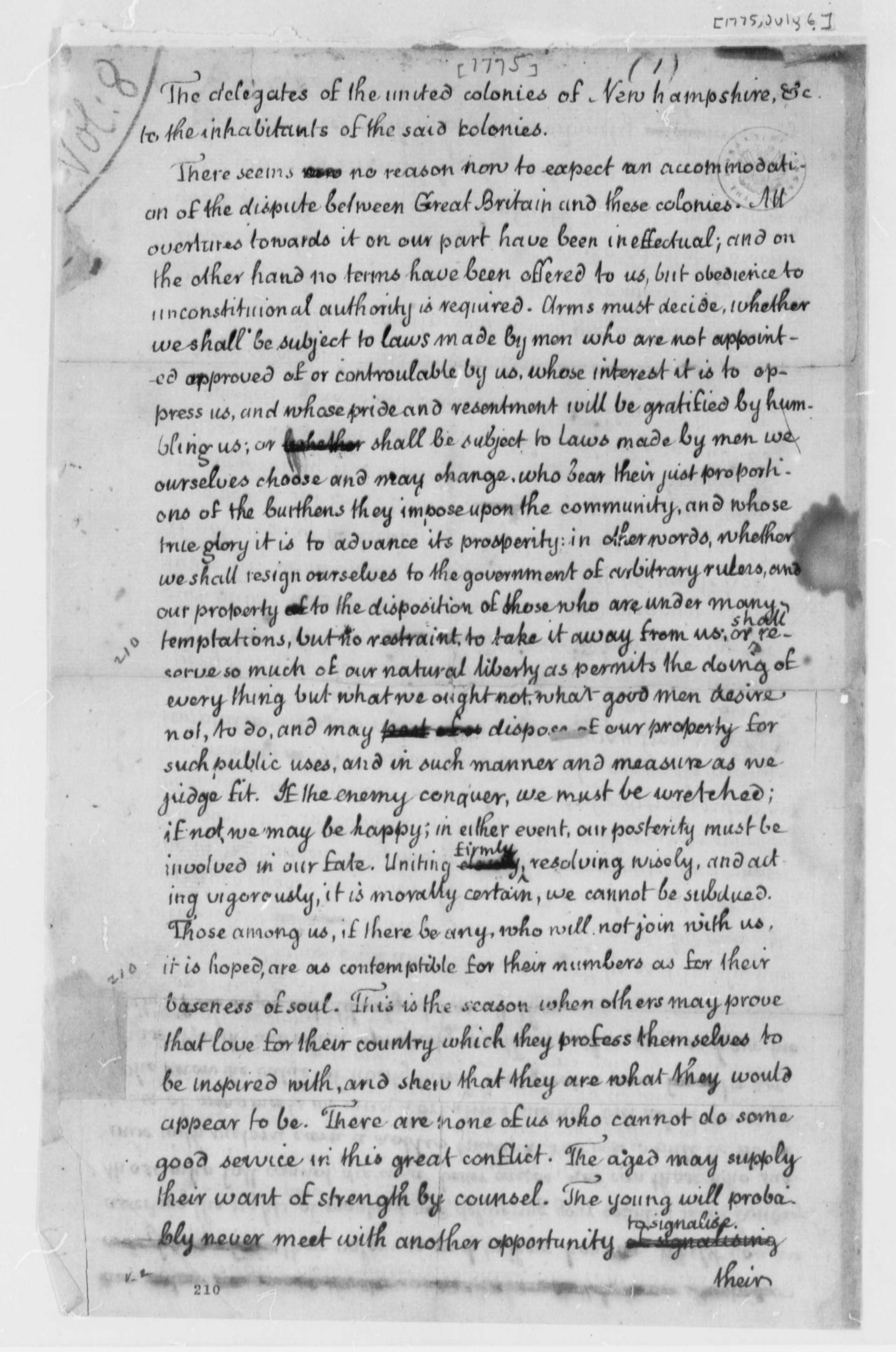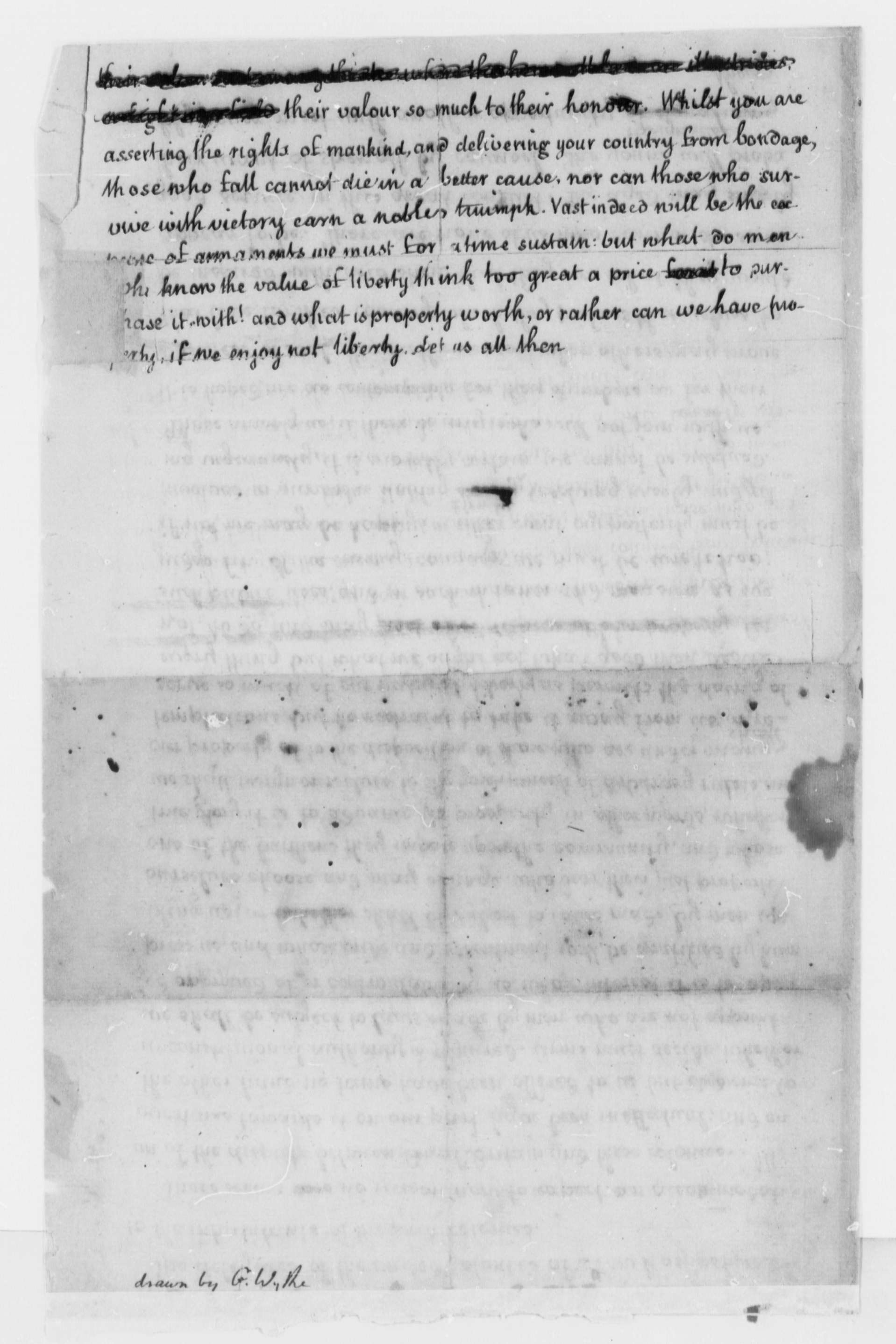Difference between revisions of "Address to the Inhabitants of the Colonies"
(→Draft text, 29 May 1776) |
m |
||
| (29 intermediate revisions by 3 users not shown) | |||
| Line 1: | Line 1: | ||
| − | In the ''Journals of the Continental Congress'' (1906), the draft of an address | + | [[File:WytheAddressToTheInhabitantsOfTheColoniesMay1776P1.jpg|right|thumb|350px|Draft for an address to the inhabitants of the Colonies "drawn by [[George Wythe]]". Image from the [http://hdl.loc.gov/loc.mss/mtj.mtjbib000110 Library of Congress,] ''The Thomas Jefferson Papers,'' incorrectly dated July 6, 1775.]] |
| + | [[File:WytheAddressToTheInhabitantsOfTheColoniesMay1776P2.jpg|right|thumb|350px|Draft for an address to the inhabitants of the Colonies "drawn by [[George Wythe]]". Image from the [http://hdl.loc.gov/loc.mss/mtj.mtjbib000110 Library of Congress,] ''The Thomas Jefferson Papers.'']] | ||
| + | In the [[Media:FordJournalsOfTheContinentalCongressVol41906.pdf|''Journals of the Continental Congress'']] (1906), the draft of an address to the "inhabitants of the colonies" is reproduced, written by [[George Wythe]], included as part of the resolutions of the Second Continental Congress for May 29, 1776. The resolutions state: | ||
<blockquote>Whereupon, | <blockquote>Whereupon, | ||
''Resolved,'' That an animated address be published to impress the minds of the people with the necessity of their now stepping forward to save their country, their freedom and property. | ''Resolved,'' That an animated address be published to impress the minds of the people with the necessity of their now stepping forward to save their country, their freedom and property. | ||
| Line 5: | Line 7: | ||
That a committee of four be appointed to prepare the address. | That a committee of four be appointed to prepare the address. | ||
| − | The members chosen, Mr. [[Thomas Jefferson|[Thomas] Jefferson]], Mr. [George] Wythe, Mr. S[amuel] Adams, and Mr. [Edward] Rutledge.<ref>''Journals of the Continental Congress'', ed. Worthington C. Ford, Vol. 4, ''January 1-June 4, 1776'' (Washington, D.C.: Library of Congress, 1906), 401-402.</ref>. | + | The members chosen, Mr. [[Thomas Jefferson|[Thomas] Jefferson]], Mr. [George] Wythe, Mr. S[amuel] Adams, and Mr. [Edward] Rutledge.<ref>[[Media:FordJournalsOfTheContinentalCongressVol41906.pdf|''Journals of the Continental Congress'']], ed. Worthington C. Ford, Vol. 4, ''January 1-June 4, 1776'' (Washington, D.C.: Library of Congress, 1906), 401-402.</ref>. |
</blockquote> | </blockquote> | ||
| − | Worthington C. Ford, the editor of the ''Journals of the Continental Congress'', | + | [[wikipedia:Oliver Walcott|Oliver Walcott]], representative from Connecticut, writes in a postscript to a letter to Roger Newberry dated June 4, 1776: "In a few days an Address to the Colonies will be published."<ref>[https://archive.org/details/lettersofdelegat04smit ''Letters to the Delegates of Congress''], ed. Paul H. Smith, Vol 4., ''May 16-August 15, 1776'', (Washington, D.C.: Library of Congress, 1979), 144.</ref> The committee did not report this (or any) an address to Congress.<ref>''Letters to the Delegates of Congress'', Vol. 4, 111n1.</ref> Worthington C. Ford, the editor of the ''Journals of the Continental Congress'', states in a footnote to the resolutions for May 29: |
<blockquote> | <blockquote> | ||
| − | In the papers of Thomas Jefferson, Vth Series, VIII, is found the following fragment, in the writing of George Wythe. It was probably intended to be the address:<ref>''Journals of the Continental Congress'', | + | In the papers of Thomas Jefferson, Vth Series, VIII, is found the following fragment, in the writing of George Wythe. It was probably intended to be the address:<ref>''Journals of the Continental Congress'', 402n1.</ref> |
</blockquote> | </blockquote> | ||
| − | ==Draft text, May 1776== | + | ==Draft text, May-June 1776== |
| − | ===Page | + | ===Page 1=== |
<blockquote> | <blockquote> | ||
| − | < | + | <br /> |
| − | + | The delegates of the united colonies of New Hampshire, &c. to the inhabitants of the said colonies. | |
| − | + | There seems no reason now to expect an accommodation of the dispute between Great Britain and these colonies. All overtures towards it on our part have been ineffectual; and on the other hand no terms have been offered to us, but obedience to unconstitutional authority is required. Arms must decide, whether we shall be subject to laws made by men who are not appointed approved of or controulable by us, whose interest it is to oppress us, and whose pride and resentment will be gratified by humbling us; or shall be subject to laws made by men we ourselves choose and may change, who bear their just proportions of the burthens they impose upon the community, and whose true glory it is to advance its posterity; in other words, whether we shall resign ourselves to the government of arbitrary rulers, and our property to the disposition of those who are under many temptations, but no restraint, to take it away from us; or shall reserve so much of our natural liberty as permits the doing of every thing but what we ought not, what good men desire not, to do, and may dispose of our property for such public uses, and in such manner and measure as we judge fit. If the enemy conquer, we must be wretched; if not, we may be happy; in either event, our posterity must be involved in our fate. Uniting firmly, resolving wisely, and acting vigorously, it is morally certain, we cannot be subdued. Those among us, if there be any, who will not join with us, it is hoped, are as contemptible for their numbers as for their baseness of soul. This is the reason when others may prove that love for their country which they profess themselves to be inspired with, and shew that they are what they would appear to be. There are none of us who cannot do some good service in this great conflict. The aged may supply their want of strength by counsel. The young will probably never meet with another opportunity to signalise their </blockquote> | |
| − | + | ===Page 2=== | |
| − | </ | + | <blockquote> |
| + | <br /> | ||
| + | their valour so much to their honour. Whilst you are asserting the rights of mankind, and delivering your country from bondage, those who fall cannot die in a better cause, nor can those who survive with victory earn a nobler triumph. Vast indeed will be the expense of armaments we must for a time sustain: but what do men who know the value of liberty think too great a price to purchase it with! and what is property worth, or rather can we have property, if we enjoy not liberty. Let us all then | ||
</blockquote> | </blockquote> | ||
| + | |||
| + | ==See also== | ||
| + | |||
| + | *[[Address to the Foreign Mercenaries]] | ||
| + | *[[Address to the Indians]] | ||
==References== | ==References== | ||
<references /> | <references /> | ||
| + | |||
| + | ==External links== | ||
| + | |||
| + | Read this book in [http://books.google.com/books?id=cFjUAAAAMAAJ&pg=PA402 Google Books]. | ||
[[Category: Letters and Papers]] | [[Category: Letters and Papers]] | ||
| + | [[Category:Wythe's Signature]] | ||
Latest revision as of 16:16, 10 March 2018


In the Journals of the Continental Congress (1906), the draft of an address to the "inhabitants of the colonies" is reproduced, written by George Wythe, included as part of the resolutions of the Second Continental Congress for May 29, 1776. The resolutions state:
Whereupon,Resolved, That an animated address be published to impress the minds of the people with the necessity of their now stepping forward to save their country, their freedom and property.
That a committee of four be appointed to prepare the address.
The members chosen, Mr. [Thomas] Jefferson, Mr. [George] Wythe, Mr. S[amuel] Adams, and Mr. [Edward] Rutledge.[1].
Oliver Walcott, representative from Connecticut, writes in a postscript to a letter to Roger Newberry dated June 4, 1776: "In a few days an Address to the Colonies will be published."[2] The committee did not report this (or any) an address to Congress.[3] Worthington C. Ford, the editor of the Journals of the Continental Congress, states in a footnote to the resolutions for May 29:
In the papers of Thomas Jefferson, Vth Series, VIII, is found the following fragment, in the writing of George Wythe. It was probably intended to be the address:[4]
Draft text, May-June 1776
Page 1
There seems no reason now to expect an accommodation of the dispute between Great Britain and these colonies. All overtures towards it on our part have been ineffectual; and on the other hand no terms have been offered to us, but obedience to unconstitutional authority is required. Arms must decide, whether we shall be subject to laws made by men who are not appointed approved of or controulable by us, whose interest it is to oppress us, and whose pride and resentment will be gratified by humbling us; or shall be subject to laws made by men we ourselves choose and may change, who bear their just proportions of the burthens they impose upon the community, and whose true glory it is to advance its posterity; in other words, whether we shall resign ourselves to the government of arbitrary rulers, and our property to the disposition of those who are under many temptations, but no restraint, to take it away from us; or shall reserve so much of our natural liberty as permits the doing of every thing but what we ought not, what good men desire not, to do, and may dispose of our property for such public uses, and in such manner and measure as we judge fit. If the enemy conquer, we must be wretched; if not, we may be happy; in either event, our posterity must be involved in our fate. Uniting firmly, resolving wisely, and acting vigorously, it is morally certain, we cannot be subdued. Those among us, if there be any, who will not join with us, it is hoped, are as contemptible for their numbers as for their baseness of soul. This is the reason when others may prove that love for their country which they profess themselves to be inspired with, and shew that they are what they would appear to be. There are none of us who cannot do some good service in this great conflict. The aged may supply their want of strength by counsel. The young will probably never meet with another opportunity to signalise their
The delegates of the united colonies of New Hampshire, &c. to the inhabitants of the said colonies.
Page 2
their valour so much to their honour. Whilst you are asserting the rights of mankind, and delivering your country from bondage, those who fall cannot die in a better cause, nor can those who survive with victory earn a nobler triumph. Vast indeed will be the expense of armaments we must for a time sustain: but what do men who know the value of liberty think too great a price to purchase it with! and what is property worth, or rather can we have property, if we enjoy not liberty. Let us all then
See also
References
- ↑ Journals of the Continental Congress, ed. Worthington C. Ford, Vol. 4, January 1-June 4, 1776 (Washington, D.C.: Library of Congress, 1906), 401-402.
- ↑ Letters to the Delegates of Congress, ed. Paul H. Smith, Vol 4., May 16-August 15, 1776, (Washington, D.C.: Library of Congress, 1979), 144.
- ↑ Letters to the Delegates of Congress, Vol. 4, 111n1.
- ↑ Journals of the Continental Congress, 402n1.
External links
Read this book in Google Books.